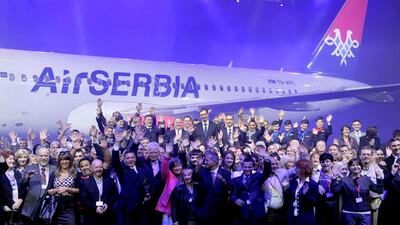Serbia’s new national carrier started flying yesterday with its first aircraft since Etihad Airways acquired a 49 per cent equity stake in August.
Air Serbia is cutting 333 jobs as it targets profitability within the first year of its privatisation.
“We have 333 registered for the redundancy programme,” said deputy prime minister Aleksandar Vucic. That brings the total number of employees to 970 in the near term. “We expect that in less than a year, this company will be profitable and charge taxes and the state gets its due. Because this state wants to make money and not lose money.”
Air Serbia is the first of a series of planned privatisation efforts by Serbia’s government to reduce its fiscal deficit. Earlier this month, Mr Vucic unveiled austerity measures which included the reduction of public sector salaries to curb excessive spending.
“The state is almost bankrupt but we will do our best … to prevent it,” he said at the time. “We are almost bankrupt, in the true sense of the word, and measures of economic recovery will be difficult.”
The deputy premier’s statements on Friday came ahead of planned talks with Abu Dhabi’s Government yesterday.
Etihad helped to relaunch Serbia’s loss-making airline Jat Airways as Air Serbia following financial pledges of US$40 million, which will be converted into a 49 per cent equity shareholding next January. The agreement, signed in August, also requires Etihad to make available up to $60m to meet Air Serbia’s operational requirements and network development.
“We are confident that this airline will move to profitability and meet the objectives of Serbia. It will also meet the objectives of Etihad as an investor,” said James Hogan, Etihad’s chief executive.
Air Serbia unveiled its first Airbus A319 with its new livery of red, blue and white. The aircraft was the first of six Airbus A319s and two A320s leased by Air Serbia.
“Air Serbia shows that Serbia can be a modern country even in its darkest hour, by creating a powerful national carrier that can outperform and make money,” Mr Vucic said.
He hopes the carrier will help to develop the country’s tourism sector and overall economy.
“Etihad Airways is an obvious example of how an airline in 10 years that brought $10 billion to the Abu Dhabi economy and opening thousands of jobs,” Mr Vucic said.
Air Serbia’s predecessor, Jat Airways, had been a loss-making airline for more than 15 years.
Its debts would be written off by the government, Mr Vucic said.
“For most of you Jat has offered your first experience of flying, it has a special place in our hearts,” said Dane Kondic, the chief executive at Air Serbia. “But the airline industry has become deregulated and more competitive. The global economic environment has been increasingly challenged and our air carrier had to be changed in order to respond to the changes taking place around the world.”
halsayegh@thenational.ae

